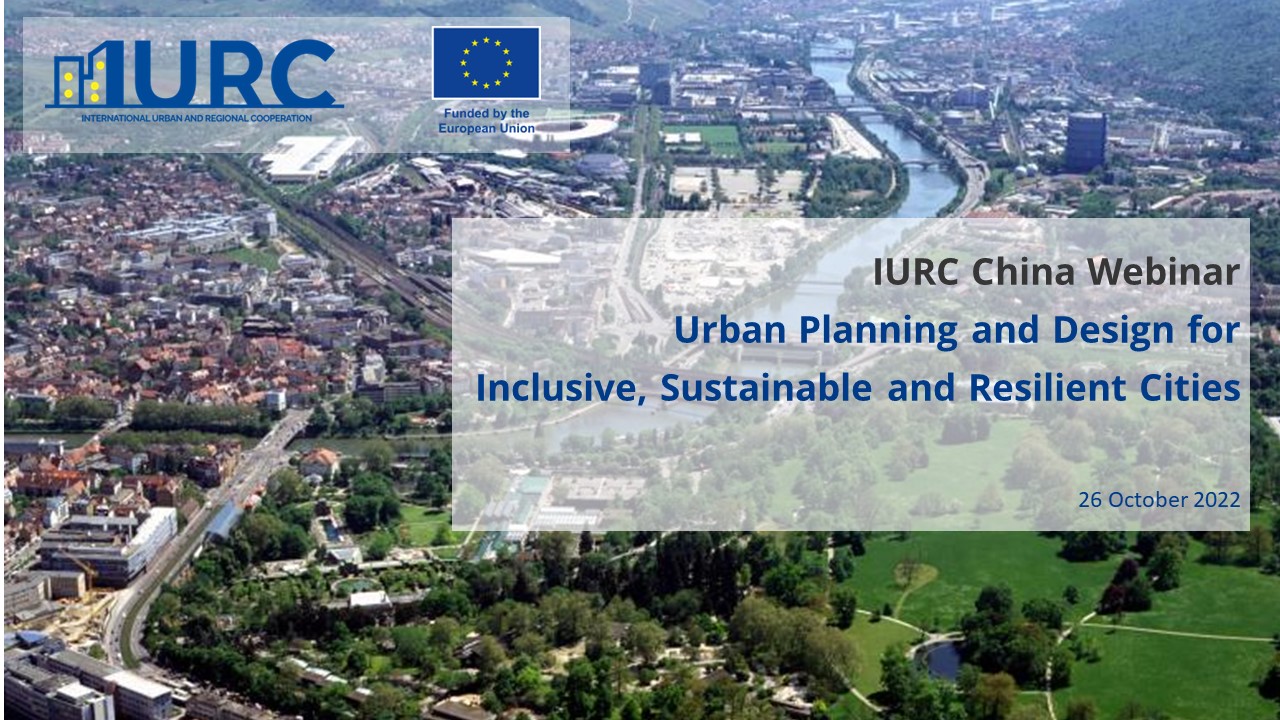The sustainability, productivity and resilience of urban systems heavily depend on transformation through urban planning and design, with the interaction of different stakeholders, allowing for reliable and forward-thinking collaboration among citizens, politicians and municipal administration. Of course, as each European and Chinese city has its own identity and socio-economic conditions, there is no one-fits-all solution. However, cities may network and learn from each other’s experiences. One city´s urban planning and design might provide inspiration and knowledge about crucial issues. Based on this understanding, cities of Stuttgart Urban Region Suzhou Ioannina Haikou joined the IURC China cooperation webinar on Urban Planning and Design. This webinar is a part of the activities in the EU Climate Diplomacy Weeks 2022, which invites participation in the global campaign to encourage cooperation on climate change and inspire concrete actions for healthy, sustainable, inclusive, and resilient cities.
Opening Session
Alexandra Lehmann from the Foreign Policy Instruments of the EU Delegation to China gave an opening remark on the EU Climate Diplomacy Weeks 2022 and encouragement regarding city-to-city cooperation on urban planning and design.
WANG Qian, Team Leader of IURC-China, delivered the welcome speech and invited for productive networking and cooperation.
Scene-Setting
Sébastien Goethals, and DAI Guowen, the SUD experts, introduced the policy and practices on urban planning and design, highlighting best practices of EU-China city-to-city cooperation and suggested on potential cooperation areas.
Panel Presentations
The “productive city” concept was embraced in the New Leipzig Charter Adopted in 2020, an EU policy framework to promote integrated and sustainable urban development. It emphasises reintegrating production into cities and metropolitan areas, promoting the low-carbon emission industry and enabling new forms of mixed-use development. This perspective is characterised in Stuttgart urban region and also in the International Building Exhibition 2027 (IBA’27), which currently takes place in the urban region. Tobias Schiller from the International Building Exhibition 2027 of Stuttgart urban region gave an overview of the program and its innovative architectural and urban projects, aiming to influence urban development discourse and practice across the region and beyond.
Haikou city shared the experience of developing the Haikou Jiangdong New District, envisioning a sustainable residential, industrial, financial and tourist urban district. The new urban area will be home to a new international trading hub for energy, shipping, commodities and financial instruments. The urban design also protects a vast nature reserve area, emphasising ecological restoration.
Ioannina city, the 10th largest municipality in Greece and a geopolitical crossroad of north Greece, set a goal of reducing CO2 emissions by at least 40% by 2030. Ms. Alexia Gidari from Ioannina introduced the urban interventions in Ioannina towards climate-neutral and smart city development.
Suzhou city, one of the core areas of the Yangtze River Delta, shared the development goals and approaches of Loujiang New District in Suzhou Taicang High-tech Zone. In the envisioned zero-carbon urban district, green manufacturing in the industry will be promoted, energy-saving standards in the construction sector will be improved, and green and low-carbon transportation will be accelerated.
Question and Discussion
In the Question and Discussion session, cities shared pathways and cooperation suggestions for better resilience, productivity, and livability. For example, Ioannina underlined public transport, smart bike-sharing biking system, and energy-efficient buildings to reach climate neutrality. Suzhou focuses on knowledge transfer in urban planning, transport design and energy planning.
Closing Remarks
WANG Qian, the team leader of IURC-China, gave a closing remark inviting leadership in climate actions and EU-China city-to-city cooperation initiations.
